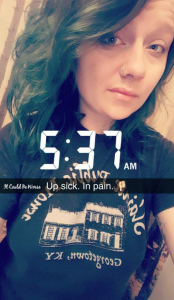Fatigue and IBD can both be unpredictable. However, recognizing these problems and finding the best ways to manage them can help IBD sufferers to get a full night’s sleep. Following are some of the issues that we deal with:
- Poor sleep quality: This can be a significant problem for those with IBD and Crohn’s disease. Midnight bathroom visits and other symptoms can negatively affect sleep quality.
- Anemia: Blood loss can cause iron deficiency and malnutrition, which adds to fatigue levels.
- Pain: Bowel inflammation, obstructions, abscesses, and fissures can be debilitating, and the pain can keep you awake at night.
- Anxiety and depression: Mental health issues can leave IBD patients feeling restless and can worsen insomnia. Mental fatigue can be equally as exhausting as physical tiredness.
- Medications: Prednisone and other steroid medications can keep patients awake. It is best to take them in the morning or early afternoon to avoid sleeplessness at night.
- Eat meals earlier to reduce the need for late-night bathroom visits.
- Consider supplementing with nutrients, such as B12, that have been lost through bleeding. Melatonin may improve your sleep quality, too. Consult your gastrointestinal doctor or healthcare team before taking any supplements or medications.
- Avoid trigger foods. I am guilty of indulging in foods that I should avoid because they can upset my digestive system. While diet does not cause IBD, certain foods can trigger symptoms. Keep a log of the foods you eat and how your body responds to them.
- Go to bed early and remove electronic devices from your bedroom. After failing to fall asleep until after 5 a.m., I get ready for bed earlier than usual on the following night in the hope of catching up on a little extra sleep.
***
Note: IBD News Today is strictly a news and information website about the disease. It does not provide medical advice, diagnosis, or treatment. This content is not intended to be a substitute for professional medical advice, diagnosis, or treatment. Always seek the advice of your physician or other qualified health providers with any questions you may have regarding a medical condition. Never disregard professional medical advice or delay in seeking it because of something you have read on this website. The opinions expressed in this column are not those of IBD News Today, or its parent company, BioNews Services, and are intended to spark discussion about issues pertaining to IBD.


